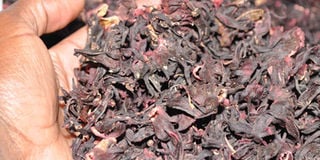Turning hibiscus flowers into wine, juice

Some of the dried hibiscus flowers before they are crushed and ready to make tea or juice. Photo by Rachel Mabala
What you need to know:
- Though it is used as a vegetable, there are other products that can be got from hibiscus, writes Lominda Afedraru
Though Hibiscus sabdariffa, also known as Roselle, grows in the wild, it is domesticated in some parts of Northern Uganda as a traditional vegetable. Many farmers are growing it on medium to large scale.
Besides being part of the diet, the plant has a number of medicinal properties and the products made from it have certain health benefits.
But a youth/women’s group in Arua District, Ayivu Women Poverty Alleviation Association, is making other products from Roselle such as wine.
Started in 2002, the association has 35 mainly female members. Many of them own other businesses such as saloons, poultry farms, retail shops but the wine and juice business is done jointly.
The proceeds are added up and shared at the end of the year.
In 2014, they joined an entrepreneurship initiative supported by International Labour Organisation (ILO) and European Union (EU) to train youth from various districts in business innovation.
After the training, they applied for a grant as a startup capital and were given Shs27m.
“When pitching our business idea, we focused on value addition on non-timber products and natural vegetative cover with medicinal and nutritional benefits,” explains Damaline Amaguru, the group’s coordinator.
“We majored in hibiscus which we collect from the wild and also buy from farmers growing hibiscus for consumption.”
Dried flowers are used in processing wine, juice and powder. The wine making activity started last year.
Fresh hibiscus is harvest, crushed and dried. Once dry, it is soaked in cold water overnight and sieved to get the liquid. Sugar, pineapple juice or grape juice is added for the right flavour.
The sugar is heated before it is added to the mixture and left to ferment for three months.
The group prefers to process a 40 litres of wine at a time, where mixing the ingredients can be apportioned easily.
Therefore, it will require 3kg of dried hibiscus and 10kg of sugar plus a litre of pineapple or grape juice.
It is made to ferment in 40-litre jerry can with an outlet for fresh air to enter.
The wine is packaged in 700ml bottles, which are sold at Shs20,000 each. However, the members buy it at Shs15,000.
The group has plans to package their wine in smaller quantities to suit various consumers such as smaller bottles which they can sell at Shs10,000.
“To process wine and juice, we bought a miller to crush the hibiscus, blender for the juice,” Amaguru points out.
EU head of cooperatives, Michelle Labeeu encouraged those, just like Ayivu Women Poverty Alleviation Association, who benefited from the three-year project, to continue with their innovations.
Citing the statistics, she noted that 40 per cent of the population comprises youth, between the age of 14 to 18. This means entrepreneurship innovations will help solve the challenge of youth unemployment.
The product
According to Damaline Amaguru, the coordinator, Ayivu Women Poverty Alleviation Association, the association started in 2002 as a village savings and credit scheme for youth who have dropped out of school.
The major activity was making crafts such as mats, food container covers, bags and table mats, which they did individually.
Then there were other activities that are agriculture-related which included rearing poultry and agro-processing on a small scale. The latter is done jointly.
Once a member has started a business enterprise, recording keeping and balancing books of accounts is key. In this way, one is able to run the business aimed at gaining profit.
“In processing wine and juice, we purchased a grinding and milling machine for crushing hibiscus, and a blending machine for processing the juice,” Amaguru points out.
The group has added another product where they are crushing dried ginger into powder form.
It is dried using energy from both sunlight and solar-powered drier, especially during wet season.
It is packaged in 500gm packs sold at Shs10,000 each.




